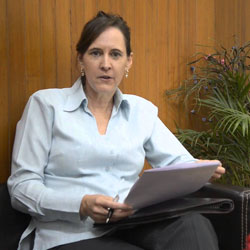

RESHAPING AGRICULTURE FOR BETTER NUTRITION –
The Agriculture, Food, Nutrition, Health Nexus
13-14 August 2018, Canberra

Joanna Kane-Potaka
 Joanna is the Assistant Director General, External Relations, International Crops Research Institute for the Semi-Arid Tropics (ICRISAT), and Executive Director, Smart Food. She began her career as an agricultural economist with the Australian Bureau of Agricultural and Resource Economics and later moved into market research in the agribusiness area of the Queensland Department of Primary Industries. She has also worked in private industry and with four CGIAR agricultural research centers in Sri Lanka, Italy, Malaysia the Philippines and is currently based in India. She also leads the global Smart Food movement which was selected in 2017 by USAID and the Australian Department of Foreign Affairs and Trade as one of the winning 10 global food innovations.
Joanna is the Assistant Director General, External Relations, International Crops Research Institute for the Semi-Arid Tropics (ICRISAT), and Executive Director, Smart Food. She began her career as an agricultural economist with the Australian Bureau of Agricultural and Resource Economics and later moved into market research in the agribusiness area of the Queensland Department of Primary Industries. She has also worked in private industry and with four CGIAR agricultural research centers in Sri Lanka, Italy, Malaysia the Philippines and is currently based in India. She also leads the global Smart Food movement which was selected in 2017 by USAID and the Australian Department of Foreign Affairs and Trade as one of the winning 10 global food innovations.
Breaking the Food System Divide with Smart Food
Food that is Good for You – the Planet – the Farmer
Abstract
One of the biggest hindrances, and rarely talked about let alone challenged, in achieving a healthy population and sustainable and viable agricultural systems in developing countries is – the ‘Food System Divide’. For decades, the majority of investments, be it on R&D, big company investment, policy support, product development or even development aid, have been funneled into just 3 major crops – rice, wheat and maize. These “Big 3” crops provide 50% of the world’s calories and protein. As a result, their value chains are well developed and supported, making it very difficult to mainstream other foods.
The need for greater diversity in diets and on farm is well known. This will require mainstreaming and ensuring the viability of more foods. This should not be tackled with just any food, but food that is good for you (nutritious and healthy), good for the planet (environmentally sustainable) and good for the farmer (viable and climate smart) – our definition of Smart Food.
The Smart Food initiative aims to learn from the successes of the Big 3 and create the Big 5 and eventually the Big 7, and so on. Smart Food will focus especially on foods that can be eaten as staples. This way, we will have a major impact on some of the leading global issues. As Smart Food is good for you, the planet and the farmer, these three qualities can in unison contribute to healthy people and sustainable and viable agriculture.